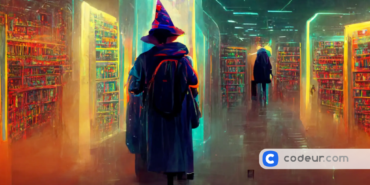Vous n’avez pas pu la rater : ChatGPT, l’intelligence artificielle développée par OpenAI, fait beaucoup parler.
Et pour cause, certains pensent déjà que l’IA pourrait remplacer les rédacteurs web… Mais pour l’instant, l’expertise d’un rédacteur web SEO reste irremplaçable !
Voyons ensemble comment optimiser vos prompts, les requêtes que vous formulez à l’intelligence artificielle, pour créer du contenu pour votre blog grâce à ChatGPT.
Préambule : les risques d’utiliser ChatGPT pour votre blog
Avant de vous lancer dans la création de contenu pour votre blog avec ChatGPT, gardez en tête que la production de contenu automatique grâce à l’IA n’est pas une pratique acceptée par Google pour le référencement naturel.
Il n’existe pas encore de pénalité officielle pour les utilisateurs de ce type de contenus. Mais il vaut tout de même mieux être prudent dans l’utilisation de l’intelligence artificielle sur votre blog, surtout dans un contexte de blog d’entreprise.
ChatGPT est effectivement un outil qui peut vous faire gagner du temps pour la rédaction et la réflexion. Nous vous conseillons de vous en servir, mais pas pour intégrer le contenu qu’il vous propose directement. Par sécurité, veillez à toujours reformuler le contenu et vérifiez la véracité de ce que l’outil avance.
C’est quoi, le prompt de ChatGPT ?
Un prompt, c’est tout simplement la commande, la requête que vous allez formuler dans l’interface de ChatGPT.
Lorsque vous posez pour la première fois une question à l’IA d’OpenAI, le résultat est tout de suite bluffant. Mais on se rend vite compte des limites de l’outil, qui formule souvent des listes et qui a tendance à se répéter.
Mais en optimisant le prompt, vous pouvez obtenir des résultats bien plus probants ! Vous avez la possibilité de donner beaucoup de paramètres à ChatGPT pour qu’il vous donne les réponses les plus précises possibles. Vous pouvez également redonner des consignes après une de ses réponses afin d’affiner le résultat.
15 idées de prompts ChatGPT pour créer des articles de blog
Voici 15 idées de prompts à utiliser sur ChatGPT pour créer des articles de blog et produire du contenu rapidement pour votre site internet !
1. Trouver des idées de sujets d’articles avec ChatGPT
Vous le savez, trouver des idées de sujets pour votre blog est toujours un processus fastidieux. Mais ça, c’est de l’histoire ancienne. Voici un prompt pour vous aider à trouver des idées de sujets d’articles de blog avec ChatGPT :

Voici la réponse obtenue :
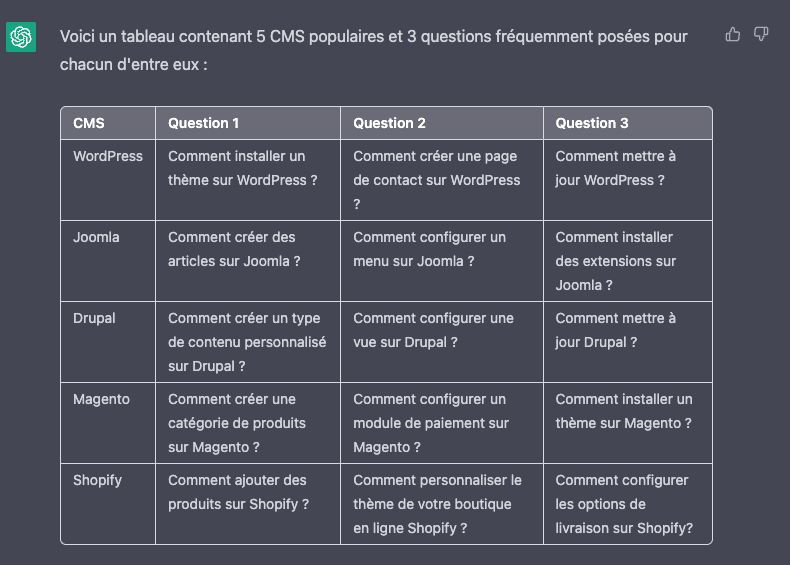
Vous avez désormais 15 sujets d’articles pour présenter les différents CMS qui permettent de créer un site e-commerce.
La seule faiblesse de ChatGPT à ce niveau concerne le choix des CMS pour cet exemple précis, mais vous pouvez toujours lui demander de renouveler l’opération avec 5 autres CMS ou avec un CMS que vous auriez en tête.
2. Trouver une liste d’avantages et d’inconvénients avec ChatGPT
Pour vous aider à trouver des informations et des idées pour rédiger vos articles, ChatGPT est très performant. Il permet de lister les caractéristiques, les avantages ou encore les inconvénients de produits ou services.
Attention tout de même car ChatGPT n’est pas directement connecté à Internet et va piocher ses résultats dans une base de données. Les informations ne sont donc pas forcément à jour. Il est toujours nécessaire de vérifier ce qu’affirme ChatGPT.
Pour apporter un peu plus de plus-value qu’un simple listing d’avantages et d’inconvénients, vous pouvez demander des éléments supplémentaires à l’intelligence artificielle :

Voici sa réponse :
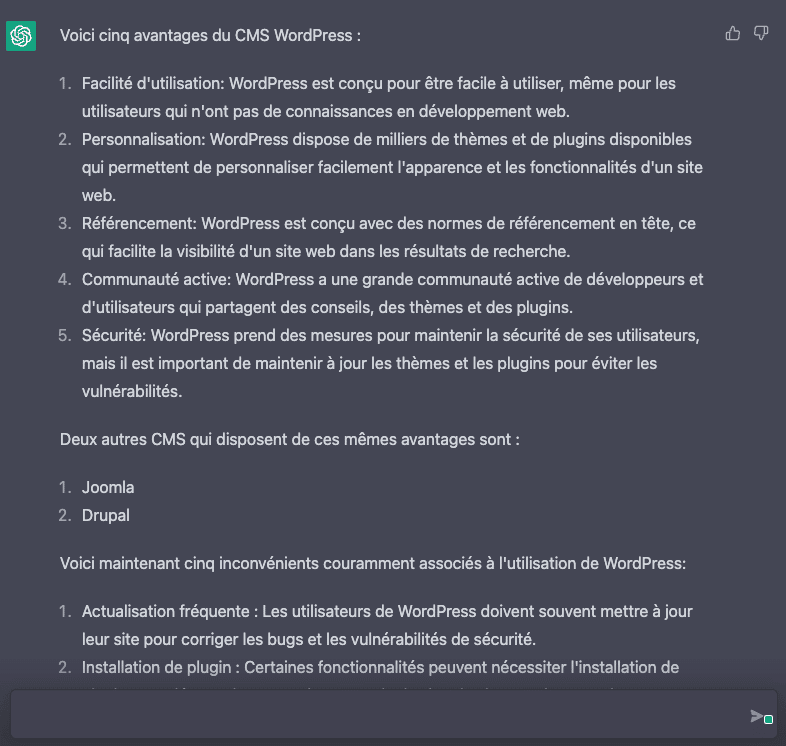
Vous avez la possibilité de combiner les demandes dans un seul prompt, tout comme vous avez la possibilité de décomposer vos questions et de faire vos demandes après chaque réponse.
3. Trouver des produits à comparer avec ChatGPT
ChatGPT peut également vous servir de moteur de recherche amélioré pour vous faire gagner du temps.
Imaginons que vous vouliez réaliser un article pour présenter des plug-ins SEO pour WordPress. Réaliser les recherches vous-même prend du temps.
Alors, pourquoi ne pas demander à ChatGPT de le faire pour vous ? Il vous suffit simplement de bien rédiger le prompt pour avoir un résultat qui sera exploitable pour votre article de blog.

Voici le tableau renvoyé par ChatGPT :
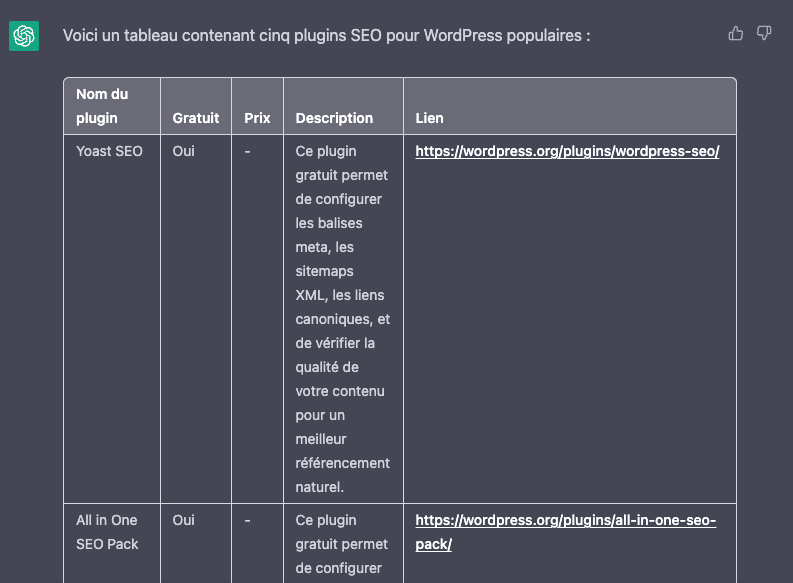
J’ai ensuite demandé si certains plugins disposaient d’une version premium payante et ChatGPT m’a gentiment listé les plugins qui proposent une version payante. Attention donc à bien prévoir de vous-même les différentes possibilités car un plugin en version gratuite ne dispose pas forcément de toutes les fonctionnalités énoncées.
4. Créer le plan d’un article avec ChatGPT
Plutôt que de demander à ChatGPT de rédiger un article à votre place, demandez-lui de rédiger le plan de cet article. Cela vous permettra d’obtenir des idées pour vous lancer dans la rédaction et d’apporter une plus-value à l’article.
L’objectif ici n’est pas de se laisser guider par l’outil : vous prenez le risque que votre article ressemble à d’autres contenus. Il s’agit plutôt de guider l’outil grâce à un prompt précis pour obtenir un plan d’article pertinent :

Voici le plan d’article de blog proposé par ChatGPT :
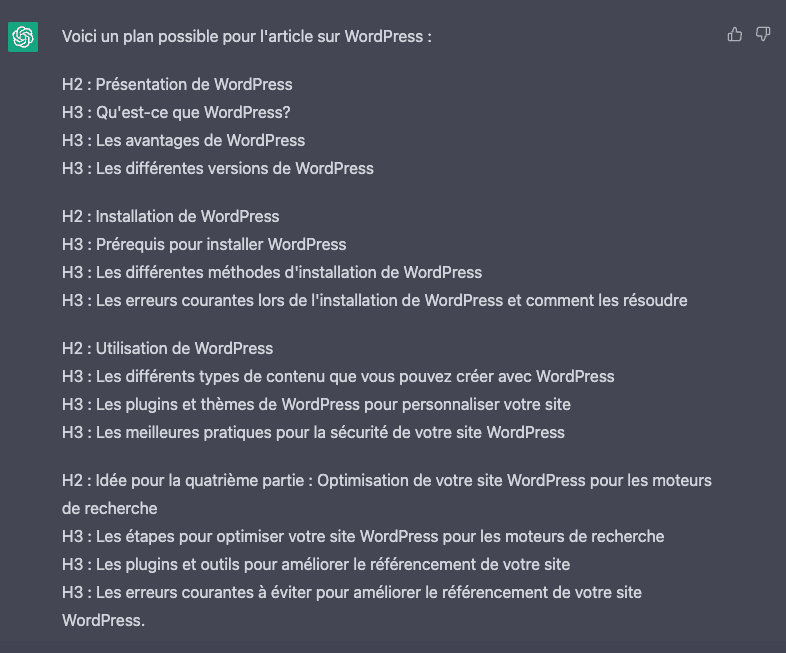
Le résultat est assez probant et la partie où nous avons demandé à ChatGPT de se débrouiller est plutôt convaincante dans le contexte de l’article.
5. Trouver des questions pour créer une FAQ avec ChatGPT
Pour trouver des idées d’articles au format “tuto” ou pour venir enrichir une FAQ sur un sujet en particulier, vous pouvez demander à ChatGPT les questions les plus fréquemment posées par les internautes.
Vous pouvez par exemple lui demander :

Voici la liste des questions qu’il nous a renvoyées :
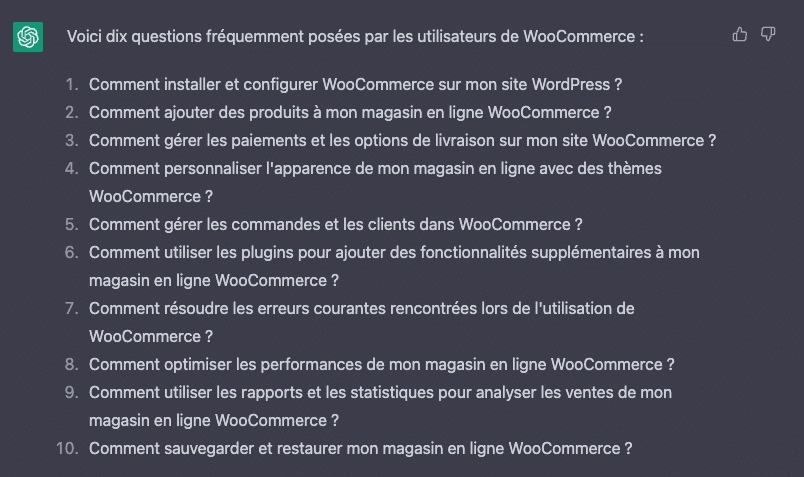
Pour gagner en pertinence, vous pouvez recouper ces informations avec des données issues d’outils SEO pour transformer ces questions en véritables articles à vocation SEO.
L’idée, avec ChatGPT, est toujours d’utiliser l’outil comme source d’inspiration plutôt que comme d’un rédacteur exécutant.
6. Dupliquer un texte en changeant son sujet avec ChatGPT
Si vous rédigez des textes pour référencer des pages sur des thématiques proches, ou pour du contenu géolocalisé, ChatGPT peut vous aider à les produire en remplaçant le sujet d’un texte existant par un autre sujet.
L’outil peut même aller plus loin et est capable de remplacer plus qu’un simple mot. Par exemple, si vous lui demandez de modifier un texte en remplaçant “chien” par “chat”, il sera capable de remplacer tout seul “canin” par “félin”, “chiot” par “chaton” pour que le texte ne perde pas son sens.
Vous pouvez même aller plus loin en demandant à l’IA dans le prompt de paraphraser le texte pour que le contenu qu’il produit soit inspiré de votre texte tout en étant complètement original :

Le résultat est bluffant :

7. Générer des call-to-action variés avec ChatGPT
Plutôt que de demander à ChatGPT de produire directement des call-to-action, vous pouvez lui demander de produire des variations des call-to-action que vous utilisez.
Cela permet à l’intelligence artificielle de se rapprocher du ton et de l’intention que vous souhaitez insuffler dans votre texte.

On voit que le résultat n’est pas tout à fait satisfaisant car pour 4 CTA, il utilise la même formulation que celle utilisée dans le CTA de base.

Il ne faut pas hésiter à profiter du système conversationnel pour lui demander de recommencer.

Le résultat est plus intéressant, mais cette fois, ChatGPT a omis de mentionner l’IA.

Une dernière consigne suffit pour obtenir le résultat attendu :

Les CTA obtenus sont beaucoup plus intéressants que les premiers formulés par ChatGPT. On remarque tout de même une répétition sur les trois derniers avec “plutôt qu’à un IA”. Mais les call-to-action obtenus sont tout à fait satisfaisants et pourraient très bien s’intégrer dans cet article !

Il ne faut pas forcément chercher à obtenir le prompt parfait dès la première itération. Échanger avec l’IA jusqu’à obtenir le résultat qui vous satisfait vous permet de lire différentes solutions.
Plutôt que de copier/coller ces CTA, vous pouvez tout à fait combiner deux phrases issues de deux résultats différents. Finalement, à travers cet échange, vous avez obtenu 15 CTA pour 5 attendus en quelques minutes.
8. Changer son style linguistique avec ChatGPT
Chaque rédacteur dispose d’un ton qui lui est propre. Si certains sont capables d’adapter leur manière d’écrire et leur style linguistique selon les consignes, cela reste un exercice difficile. C’est pourquoi il est conseillé de faire appel à un rédacteur professionnel dès lors que vous souhaitez insuffler une énergie particulière à vos contenus.
Mais pour changer votre style linguistique, vous pouvez également demander à ChatGPT de transformer vos contenus.
Vous pouvez notamment demander à l’outil de :
- Utiliser le tutoiement ou le vouvoiement ;
- Changer le style ;
- Rallonger ou raccourcir les phrases.

Encore une fois, le résultat est étonnant.

Et comme à chaque fois, il est tout à fait possible de demander des ajustements. Ici, le ton est presque un peu familier. On pourrait demander à l’outil “Reformule le texte de manière un peu moins familière en gardant le tutoiement”.
9. Demander à ChatGPT de corriger ses fautes d’orthographe
Fonction basique mais très utile, la correction orthographique. Pensez à préciser à l’outil d’éviter de reformuler votre texte pour qu’il s’occupe simplement de la correction.
Attention, l’intelligence artificielle fait du bon travail mais peut rater quelques subtilités de la langue française. Nous avons réussi à le piéger avec “pallier à” par exemple.

Sans mauvais jeu de mot, c’est un sans faute !

10. Demander un résumé de l’article à ChatGPT
Vous avez besoin d’un résumé en quelques instants d’un article de blog qui fait 1500 ou 2000 mots ? Pas de problème. ChatGPT est capable de vous faire un résumé. Vous pouvez même lui demander de transformer ce résumé en véritable publication LinkedIn :

Méfiez-vous tout de même car sur plusieurs tests, le CTA pour inviter à identifier un ami en commentaire était systématiquement le même.

Comme nous l’avons déjà dit à plusieurs reprise, servez-vous du prompt pour lui demander de reformuler le CTA, ou reformulez-le vous-même pour qu’il corresponde à votre style. ChatGPT reste un outil qui vous fait gagner du temps, mais qui ne sera jamais capable de faire tout le travail à votre place parfaitement.
11. Faire rédiger la meta description à ChatGPT
Comme pour le résumé, vous pouvez demander à ChatGPT de rédiger la meta description de vos pages.
La seule limite à cette commande concerne la longueur de la meta description. ChatGPT a parfois du mal à respecter une longueur maximale lorsqu’elle est exprimée en caractères. Nous préférons donc ne pas le brider en rédigeant le prompt :

Le résultat fait un peu plus de 230 caractères. On peut donc se suffire de la première phrase, ou choisir une meta description longue puisque les moteurs de recherche affichent parfois des descriptions plus longues.

Plutôt que de se focaliser sur la longueur, intéressez-vous ici à la capacité de ChatGPT à produire un résumé percutant et une accroche qui donne envie aux internautes de cliquer. N’hésitez pas à demander à l’intelligence artificielle de recommencer pour avoir une description plus marketing.
12. Demander à ChatGPT de supprimer des mots ou des paragraphes dans un texte
Vous avez rédigé un contenu sur un sujet, mais vous souhaitez finalement changer l’orientation du texte ? Vous pouvez demander à ChatGPT de supprimer des mots d’un texte ou carrément des paragraphes.
En fonction de votre besoin, vous avez la possibilité d’ajouter dans vos prompts des demandes supplémentaires pour que l’IA remplace le mot ou reformule des phrases.
Dans l’exemple ci-dessous, nous avons demandé à l’intelligence artificielle de supprimer un paragraphe contenant un mot-clé en particulier et de le remplacer totalement par un autre.

Le résultat fonctionne parfaitement, le paragraphe gênant a été supprimé et brillamment remplacé en respectant le contexte de l’article, sans avoir eu besoin d’en dire plus !

13. Demander à ChatGPT de mettre un texte au format HTML
La mise en forme HTML d’un texte n’a rien d’une tâche à forte valeur ajoutée. Vous pouvez demander à ChatGPT de le faire à votre place.
Pratique pour ajouter les balises d’une liste par exemple, puisque l’outil est capable de les détecter. Il supprime même de lui-même les tirets pour éviter que le tiret ne fasse doublon avec la puce de la liste HTML.
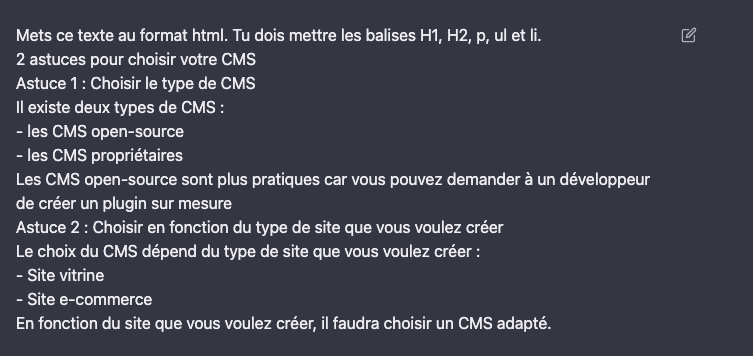
Et voilà le résultat ! Évidemment, si vous avez un texte long avec des H2, H3, H4, H5, il ne sera pas forcément capable de détecter tout seul le niveau de chaque titre, mais là encore, vous pouvez lui donner des indications en indiquant le niveau du titre avant le texte (un peu comme lorsque vous rédigez le plan d’un article).
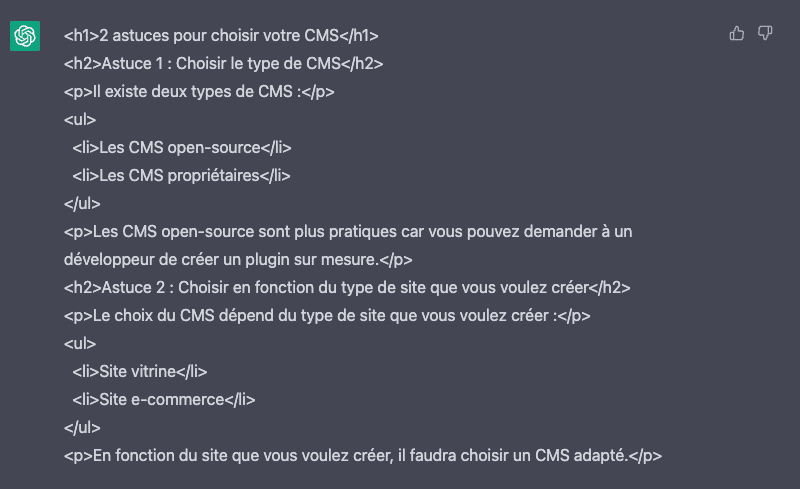
14. Demander à ChatGPT de ranger des informations dans un tableau et de vous fournir le HTML du tableau
Si vous demandez à ChatGPT des informations dans un tableau, vous pouvez lui ordonner de les classer en fonction de nombreux critères : ordre alphabétique, données numériques, etc…
En plus, vous avez également la possibilité de lui demander le code HTML de ce tableau pour pouvoir l’intégrer directement dans un article de blog ou dans une page web.
Pensez à bien décomposer votre prompt avec chaque étape dans un ordre logique pour que l’intelligence artificielle n’interprète pas mal vos consignes.

Voilà le résultat en HTML :
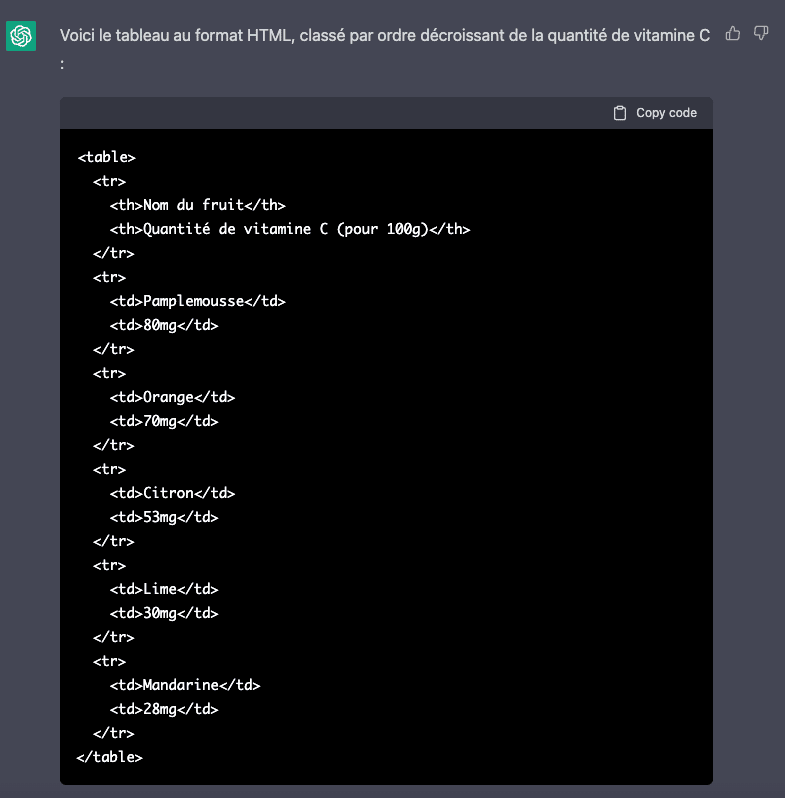
Le résultat dispose même d’un petit bouton en haut à droite pour copier le code HTML sans avoir à le sélectionner manuellement ! Que demander de plus ?
15. Demander à ChatGPT d’insérer des balises strong dans un texte en HTML
Pour optimiser votre SEO, vous pouvez aussi vous faire aider de ChatGPT. Vous pouvez rédiger un prompt simple, sans risque, en vous limitant à un mot-clé à entourer les balises strong.
Vous pouvez également demander à l’outil de se débrouiller sans le guider de manière trop stricte sur le mot-clé sur lequel vous souhaitez que votre texte se référence. ChatGPT insérera alors les balises sur des expressions un peu plus variées.
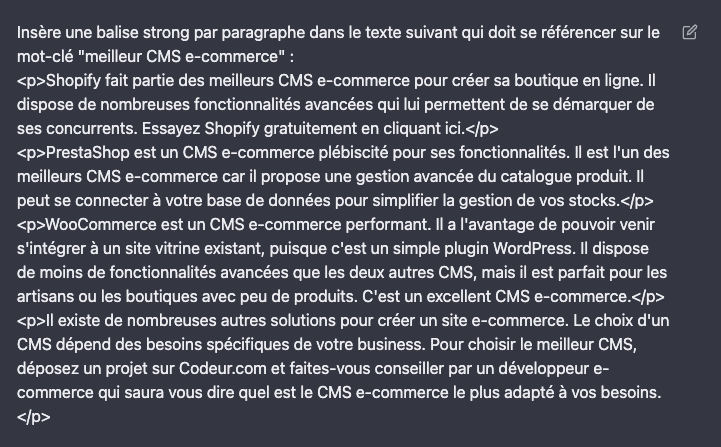
Sans surprise, la consigne est bien respectée :
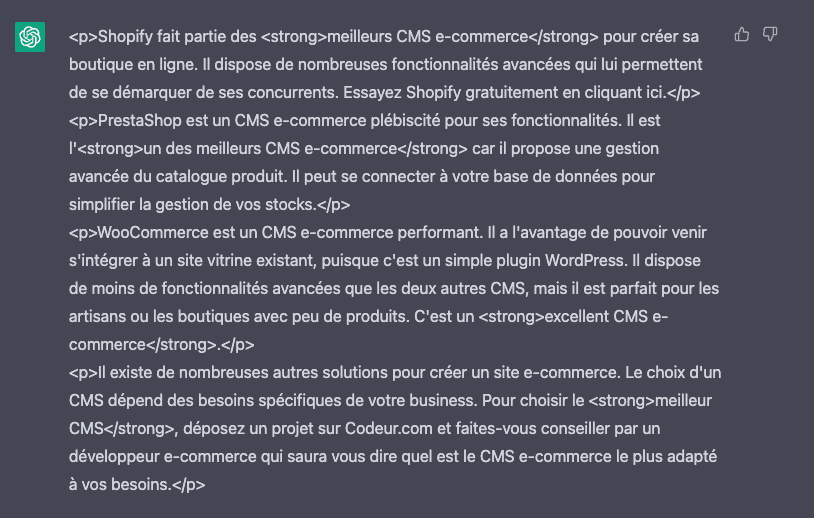
Les balises strong sont positionnées sur des mots-clés pertinents et variés, pas uniquement sur le mot-clé “CMS e-commerce” ou “meilleur CMS e-commerce”.
Les choses à faire si vous utilisez ChatGPT sur votre blog
Voici maintenant quelques conseils généraux à appliquer à votre utilisation de ChatGPT pour gagner en pertinence et pour produire des contenus à forte valeur ajoutée sur votre blog.
Reformulez ce que ChatGPT vous propose
Si vous utilisez beaucoup ChatGPT, vous vous en êtes peut-être rendu compte. Le ton de base de ChatGPT est identifiable et certaines tournures de phrases sont reconnaissables à la longue. Si ce ton n’est pas problématique en tant que tel, il sera peut-être à terme identifiable par les moteurs de recherche.
Pour éviter de voir votre site ou votre blog être pénalisé si les moteurs de recherche proscrivent définitivement l’utilisation de l’IA pour le référencement naturel, alors la reformulation et la réécriture manuelle sont à mettre en œuvre dès maintenant.
Ajoutez des idées uniques en plus de ce que ChatGPT énumère
Rédiger des prompts pour trouver des idées est une bonne chose. On ne peut pas penser à tout et ce genre d’outils permet de se faciliter la vie. Mais si tout le monde fait pareil, vos articles n’auront aucune plus-value et aucune saveur.
Servez-vous de ChatGPT pour enrichir un contenu que vous avez imaginé et pas l’inverse. Si vous souhaitez proposer une liste de conseils par exemple, trouvez les conseils qui vous semblent les plus pertinents, puis demandez à ChatGPT de vous aider à en trouver d’autres pour atteindre un compte rond.
Si vous vous reposez sur l’intelligence artificielle à longueur de temps, votre blog ne sera rempli que de généralités.
Vérifiez si les informations sont exactes
Comme nous vous le disions un peu plus tôt, les informations sur lesquelles se base l’intelligence artificielle de ChatGPT ne sont pas forcément à jour. Ainsi, si vous lui demandez les tarifs d’un service en ligne par exemple, il est possible que le prix ne soit pas le bon.
Sur des données sensibles ou des informations comme des prix, veillez toujours à recroiser les données avec une source en direct. Pour vous faciliter la tâche, vous pouvez dans le prompt, demander à ChatGPT de vous afficher les sources pour pouvoir aller vérifier facilement les informations.
Soyez précis dans l’écriture de vos prompts
N’hésitez pas à faire des tests en rédigeant les prompts. Si vous vous apercevez que le résultat que l’IA est en train d’écrire ne correspond pas à vos attentes, arrêtez-le, modifiez le prompt et recommencez.
Évitez les phrases à rallonge qui compliquent la compréhension et favorisez les petites phrases courtes qui s’enchaînent : “Liste-moi ceci”, “Trie les informations de telle manière”, “Affiche-les dans un tableau”, etc.
Les choses à éviter quand vous utilisez ChatGPT sur votre blog
Enfin, pensez qu’il vaut mieux éviter certaines choses lorsque vous utilisez ChatGPT pour limiter les erreurs et les risques SEO ou de duplicate content.
Évitez de lui demander de rédiger l’article en entier
Faire rédiger à l’IA un article complet est le meilleur moyen d’obtenir un article générique et peu qualitatif. Même si le ton de l’article sera toujours “bon” et que la plupart des informations sont relativement à jour, vous obtiendrez un article qui manque de peps, qui manque de votre touche, de votre savoir-faire.
Servez-vous plutôt des prompts proposés dans l’article pour obtenir de l’aide de ChatGPT dans la conception de vos articles et rédigez-les vous-même, quitte à demander à l’outil de corriger les fautes d’orthographe ou de reformuler certains passages.
Évitez de copier/coller sans relire
Même si les risques sont assez faibles, la possibilité que ChatGPT propose deux fois le même contenu à des internautes qui lui poseraient la même question n’est pas à exclure.
Alors, si vous demandez à l’intelligence artificielle d’OpenAI de rédiger des contenus, veillez à toujours les réécrire, les paraphraser, les adapter au ton de votre blog.
Évitez de devenir dépendant à ChatGPT
Enfin, ne tombez pas dans la ChatGPT dépendance. Si le service venait à fermer ou à devenir payant, vous vous retrouveriez comme un artiste sans sa muse.
Ces outils sont des moyens d’accélérer votre productivité, pas des outils pour remplacer votre créativité. Gardez le contrôle de votre blog et de votre site et ne soyez pas dépendant de l’IA pour produire des articles qualitatifs et différenciants !
Notre astuce pour utiliser ChatGPT pour votre blog
Vous avez maintenant toutes les clés pour utiliser ChatGPT afin de créer du contenu à destination de votre blog ou de votre site.
Gardez à l’esprit que ChatGPT n’est qu’un outil et qu’il ne remplacera jamais votre savoir-faire en termes de SEO, ni votre instinct en termes de tendances à suivre.
Pour la rédaction de vos contenus, ne devenez pas dépendant d’un outil : faites plutôt appel à un rédacteur web SEO qui, en plus de rédiger des contenus pertinents pour vos lecteurs, sera capable d’optimiser l’article pour le référencement naturel sans risque de pénalités !

